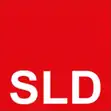List of political parties in Poland
This article lists current political parties in Poland, as well as former parties dating back as far as 1918. Since 1989, Poland has had a multi-party system, with numerous competing political parties. Individual parties normally do not manage to gain power alone, and usually work with other parties to form coalition governments.
 |
|---|
The transition from a mono-party Communist regime to liberal democracy and pluralism resulted in new political parties mushrooming in the early 1990s. After the first free parliamentary elections in 1991 seats in the Sejm were divided among more than a dozen different parties (amongst them such curiosities as the Polish Beer-Lovers' Party (Polska Partia Przyjaciół Piwa), led by a popular comedy actor, Janusz Rewiński). The existence of so many parties in the Sejm was seen by many as being counterproductive to the effectiveness of the parliament and a hindrance towards producing stable governments. Consequently, electoral reform was undertaken and an electoral threshold for the Lower House was instituted prior to the 1993 elections. The set threshold required a minimum vote of 5% for parties (with exemptions for ethnic minority parties) and 8% for electoral coalitions. The threshold was set at the national, rather than divisional, level, and had the effect of preventing many minor parties from winning seats in later elections. The threshold also prevented independent candidates from gaining election to the Sejm. Since 1990, the left side of the political scene has generally been dominated by former Communists turned social democrats. The right has largely comprised (former) Solidarity activists and supporters, but experienced deep divisions from the beginning, and showed less cohesiveness than the left. The right were unable to create a single bloc which could act as a lasting counterweight to the left-wing monolith, but instead, kept merging, splitting and renaming. Even so, the parties of the right did manage to win government again from 1997 to 2001 (having initially governed from 1989 to 1993).
Since the parliamentary elections of 2005, the right-wing parties have dominated the political scene, and appear to be in their strongest position to date. Two important developments in the political landscape have taken place since 2005. Firstly, the SLD (Communist successor) party is no longer the major, or one of the two major parties. Secondly, the main political battleground is no longer between the ex-Solidarity right versus the ex-Communist left. The new competing groupings are those of the Law and Justice party (promoting economic interventionism and social conservatism) and the Civic Platform (representing a more liberal-conservative position). The general public disapproval of politics and politicians as a whole has resulted in almost all major parties excluding the very word "party" from their names, replacing it with words less associated with politics, such as "union", "platform", "league" or "alliance".
Parliamentary parties
Parties without representation
Far-left
| Party | Leader | Ideology | Comments | |||
|---|---|---|---|---|---|---|
.svg.png.webp) |
Polish Communist Party Komunistyczna Partia Polski |
KPP | Krzysztof Szwej | Marxism-Leninism Stalinism Anti-revisionism |
Founded in 2002 as the successor of the Union of Polish Communists "Proletariat", which was founded in 1990. It is considered to be the historical and ideological heir of the Communist Party of Poland, which operated from 1918 to 1938. Affiliated with INITIATIVE. | |
| Edward Gierek's Economic Revival Movement Ruch Odrodzenia Gospodarczego im. Edwarda Gierka |
ROG | Paweł Bożyk | Communism Socialism Anti-capitalism Anti-Atlanticism |
Refers to the achievements of Edward Gierek's (Secretary of the Central Committee of the Polish United Workers' Party, 1970–1980) rule. It is against Poland's membership in NATO and postulated the withdrawal of troops from Iraq. | ||
Left-wing
| Party | Leader | Ideology | Comments | |||
|---|---|---|---|---|---|---|
| AGROunion AgroUnia |
AU | Michał Kołodziejczak | Agrarianism Democratic socialism |
Left-wing agrarian political movement founded in July 2018 by Michał Kołodzejczak inspired by the Samoobrona movement, which promotes farmers' interest and economic nationalism.[1] | ||
| Action of Disappointed Retirees and Pensioners Akcja Zawiedzionych Emerytów Rencistów |
AZER | Wojciech Kornowski | Pensioners' rights Solidarism Left-wing nationalism[2] |
Founded in 2018 by former leader of The Confederation of Polish Employers, Wojciech Kornowski. Its main goal is protecting retired seniors, pensioners and trust-busting. | ||
 |
National Party of Retirees and Pensioners Krajowa Partia Emerytów i Rencistów |
KPEiR | Tomasz Mamiński | Pensioners' rights Democratic socialism[3][4] |
Founded in 1994. It lost its first parliamentary election in 1997 winning just 2.18% and no seat in Sejm and Senate. In the parliamentary elections in 2015, several activists of KPEiR competed for the Sejm from the lists of the United Left, which did not obtain any seats. | |
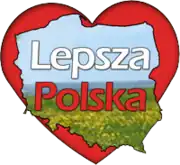 |
Better Poland Lepsza Polska |
LP | Cezary Stachoń | Green politics Egalitarianism Solidarism |
Small green party related to the degrowth movement which took part in the 2010 Warsaw mayoral election.[5] | |
| Peasants' Party Partia Chłopska |
PCh | Krzysztof Filipek | Agrarian socialism Left-wing nationalism Left-wing populism |
Founded by Krzysztof Filipek and other former members of Self-Defence. | ||
| Polish Party of Animal Protection Polska Partia Ochrony Zwierząt |
PPOZ | Andrzej Olszewski | Animal rights Animal welfare Environmentalism |
PPOZ aspires to turn away from the anthropocentric view of life. Its main goal is the introduction of more animal rights. | ||
 |
Self-Defence Rebirth Samoobrona Odrodzenie |
SO | Sławomir Izdebski[6] | Agrarian socialism Left-wing nationalism Left-wing populism |
Founded in 2007 from the merger of the Self-Defense Social Movement party and several other marginal groups formed by splitters from the Self-Defense of the Republic of Poland. | |
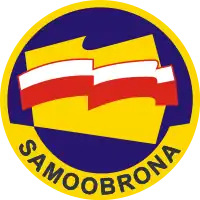 |
Self-Defence of the Republic of Poland Samoobrona Rzeczypospolitej Polskiej |
SRP | Krzysztof Prokopczyk | Agrarianism Socialism[7] Left-wing nationalism Left-wing populism |
SRP became prominent in the 2001 parliamentary election, winning 53 seats, after which it gave confidence and supply to the SLD government. It elected 6 MEPs in 2004 and switched its support to PiS after the 2005 election, in which it won 56 seats and entered the government coalition. In 2007, the party leader was dismissed from his position and the party withdrew from the coalition. This precipitated a new election, at which the party collapsed and lost all of its seats. | |
 |
Liberty and Equality Wolność i Równość |
WiR | Piotr Musiał | Democratic socialism Progressivism Anti-clericalism |
Founded in 2005 as a Union of the Left, in 2015 its name was changed to Liberty and Equality. It usually takes part in elections as part of coalitions of larger left-wing parties. | |
Centre-left to left-wing
| Party | Leader | Ideology | Comments | |||
|---|---|---|---|---|---|---|
| Polish Left Polska Lewica |
PL | Jacek Zdrojewski | Social democracy Democratic socialism |
Formed in 2007 when former Prime Minister Leszek Miller and many other members of parliament withdrew from the Democratic Left Alliance, which Miller had headed for many years. His departure also served as a public protest against the policies of party leaders. In 2010 Miller left the party and decided to return to SLD. | ||
| New Democracy - Yes Nowa Demokracja - Tak |
ND-T | Marek Materek | Progressivism[8] Regionalism |
Left-wing party founded by Marek Materek that seeks to empower local governments and promote decentralisation of Poland. The party gathers together various regionalist and autonomist activists, along with local government officials that seek to reverse excessive centralisation of the Polish administration.[9] | ||
Centre-left
| Party | Leader | Ideology | Comments | |||
|---|---|---|---|---|---|---|
| Nonpartisan Local Government Activists Bezpartyjni Samorządowcy |
BS | Robert Raczyński | Localism Regionalism[10] Federalism[11] |
Decentralised and federalised party formerly associated with the progressive wing of Christian democracy that promotes local and regional interests, and advocates for democratisation and federalisation of the Polish administrative system. | ||
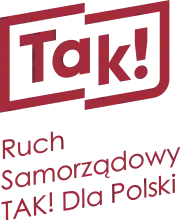 |
Yes! For Poland Tak! Dla Polski |
T!DPL | Jacek Karnowski | Regionalism Decentralization Pro-Europeanism |
Regionalists party composed of regional activists and local government officials that advocates for decentralisation of power, democratisation of the Polish school system, environmentalism, reformed health service and increased public funding. | |
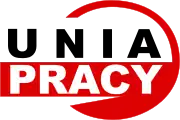 |
Labour Union Unia Pracy |
UP | Waldemar Witkowski | Social democracy Anti-clericalism Progressivism |
Small social-democratic party which usually aligns itself with the Democratic Left Alliance. It was founded in 1992 by left-wing anti-communist politicians. Affiliated with PES. | |
| Social Democracy of Poland Socjaldemokracja Polska |
SDPL | Wojciech Filemonowicz | Social democracy Social liberalism Progressivism |
Founded in 2004 as a splinter group from Democratic Left Alliance. SDPL contested its first elections in 2004. Party gained 5.3%, which saw 3 members elected to the European Parliament. In 2005 they managed to gain 3.9% of the vote and fell short of the 5% threshold. SDPL put forward its leader Marek Borowski as candidate for the presidential elections. He came 4th winning 10.3% of the vote. SDPL usually takes part in elections as part of coalitions. | ||
Centre
| Party | Leader | Ideology | Comments | |||
|---|---|---|---|---|---|---|
| New Solidarity/Shared Poland Ruch Wspólna Polska |
WP | Rafał Trzaskowski | Progressivism Conservatism Liberalism Pro-Europeanism |
Shared Poland (Polish: Ruch Wspólna Polska), also known as New Solidarity (Polish: Nowa Solidarność), is a political movement started by Rafał Trzaskowski, Mayor of Warsaw and former leading candidate in the 2020 Polish Presidential Election. It was founded in October 2020. | ||
 |
Direct Democracy Demokracja Bezpośrednia |
DB | Marzena Petykiewicz | Direct democracy E-democracy Progressivism |
DB's creation was inspired by the 2012 protests against ACTA. In the elections to the European Parliament in 2014, DB set up its own committee, which received 0.23% of the votes. In the 2015 presidential election, DB's candidate was Paweł Tanajno, who took the last place with 0.2% of votes. In the parliamentary elections in 2015, five DB activists (including Tanajno) entered the Sejm from lists of the Kukiz'15. None of them received a mandate. | |
| One-PL Jeden-PL |
1PL | Włodzimierz Zydorczak | Eurofederalism Liberalism Direct democracy |
Founded as Civic Republic of Poland. | ||
| Polish Internet Party Polska Partia Internetowa |
PPI | Leszek Lacheta | Green liberalism E-democracy Liberalism |
Founded in 2019. Party combines ecologic stances with economic liberalism. | ||
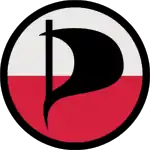 |
Polish Pirate Party Polska Partia Piratów |
P3 | Michał Dydycz | Pirate politics Liquid democracy Freedom of information |
Before European Parliament elections in 2014, P3 concluded an agreement with DB, by virtue of which its activists were included in the lists of the DB committee, which received 0.23% of the votes. In the local elections of the same year, Tomasz Słowiński was nominated by KNP as a candidate in Skierniewice presidential elections, taking the last, 6th place with slightly more than 2% support. Affiliated with PPEU. | |
| Polish Alliance of Democrats Polskie Stronnictwo Demokratyczne |
PSD | Krzysztof Góralczyk | Christian democracy Liberalism Centrism |
Founded in 2013 by Christian democratic wing of Alliance of Democrats. It started transient cooperation with Poland Together. | ||
| Enterprising Republic of Poland Przedsiębiorcza Rzeczypospolita Polska |
PRP | Robert Krzemiński | Economic liberalism Anti-bureaucratism Populism |
Main postulates of party include liberalisation of economy, reduction of taxes and introduction of criminal and financial responsibility of officials. | ||
| Alliance of Democrats Stronnictwo Demokratyczne |
SD | Paweł Piskorski | Liberalism Social liberalism Centrism |
Originated in the Democratic Clubs, which were opposed to authoritarian tendencies in Poland between the two World Wars. The first club was founded in Warsaw in 1937. In the People's Republic of Poland SD became a satellite party of the communist Polish United Workers' Party regime. After 1990, most of the members of the SD joined other parties, such as the Freedom Union. Party continued to exist, but had only a small support base, and was not represented in parliament. Affiliated with EDP. | ||
Centre-right
| Party | Leader | Ideology | Comments | |||
|---|---|---|---|---|---|---|
| Christian Democracy of the 3rd Polish Republic Chrześcijańska Demokracja III Rzeczypospolitej Polskiej |
ChDRP | Lech Wałęsa | Christian democracy Social conservatism Social market economy |
Founded in 1997 by former president Lech Wałęsa. It took the German CDU as a role model. In 2000 Wałęsa ran in the presidential election, receiving 1.01% of votes (he took 7th place out of 12 candidates). | ||
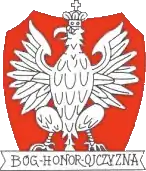 |
Organisation of the Polish Nation - Polish League Organizacja Narodu Polskiego – Liga Polska |
ONP-LP | Stanisław Bujnicki | Political Catholicism Polish minority interests[12] |
Political party which associates Poles living abroad. | |
| Confederation of Independent Poland Konfederacja Polski Niepodległej |
KPN | Władysław Borowiec | Sanationism Anti-communism Syncretic politics |
Founded in 1979 by Leszek Moczulski and others declaring support for the pre-war traditions of Sanacja and Józef Piłsudski. It was the first independent political party that was publicly proclaimed in the Eastern Bloc. After the fall of communism, Leszek Moczulski got only 2.5% of votes in 1990 presidential election. In 1991 parliamentary election the party got 7.5% of the vote, while in the 1993 parliamentary election it received 5.7%. | ||
| Freedom Party Partia Wolności |
PW | Anna Karbowska | Conservative liberalism Economic liberalism Republicanism |
Founded by moderate splitters from Congress of the New Right and "The Republicans" Association. | ||
| People's Party "Patrimony" Stronnictwo Ludowe "Ojcowizna" |
SL"O" | Kazimierz Chorzępa | Agrarianism Social conservatism Solidarism |
Refers to the Polish People's-Christian Forum "Patrimony" - a party operating in the years 1991–1997. Many activists of trade union "Solidarity of Individual Farmers" belong to "Patrimony". Its founder Roman Bartoszcze was a candidate in 1990 presidential elections. | ||
| Labour Party Stronnictwo Pracy |
SP | Zbigniew Wrzesiński | Solidarism Christian democracy Social market economy |
Founded in 1989 on the initiative of the activists of the Christian Democratic Club of Political Thought. In 1990 the name Christian-Democratic Labour Party (ChDSP) was adopted. It referred to the Labour Party operating in the years 1937–1950. | ||
Centre-right to right-wing
| Party | Leader | Ideology | Comments | |||
|---|---|---|---|---|---|---|
| Effective Skuteczni |
Piotr Liroy-Marzec | Classical liberalism Economic liberalism Direct democracy |
Created in 2018 by former rapper and MP Liroy. It cooperated with Confederation in 2019 European Parliament elections, but left the coalition a few weeks later. | |||
| "Piast" Party Stronnictwo Piast |
Piast | Zdzisław Podkański | Agrarianism Social conservatism Christian democracy |
Formed in 2006 as a result of the break-up in PSL and the departure of the right wing of the party. Its name refers both to the Polish medieval Piast dynasty and to the pre-war conservative party PSL Piast. | ||
Right-wing
| Party | Leader | Ideology | Comments | |||
|---|---|---|---|---|---|---|
| Social Alternative Alternatywa Społeczna |
AS | Krzysztof Przybylak | Right-wing populism National conservatism Christian right |
Founded by Piotr Wroński - Colonel of the Intelligence Agency and a former officer of Polish Special Services. | ||
| Europe of Free Fatherlands - Polish Party Europa Wolnych Ojczyzn – Partia Polska |
EWO-PP | Jan Szczepankiewicz | Anti-Lisbon Treaty National liberalism Souverainism |
Marginal party was founded in 2008 as an opposition to the Lisbon Treaty. | ||
| Decent Life Godne Życie |
GŻ | Grzegorz Masierowski | Direct democracy Right-wing populism Souverainism |
Small populist party which never participated in any elections. | ||
 |
II Republic of Poland II Rzeczpospolita Polska[13] |
II RP | Jan Zbigniew Potocki | Sanationism[14] | Founded by Jan Zbigniew Potocki, who claims that he is the legitimate President of Poland and that the Constitution of 1935 is still in force. | |
| Unity of the Nation Jedność Narodu |
JN | Romuald Starosielec | National conservatism National liberalism Ordoliberalism |
Registered one list in 2019 European Parliament election. It won 0.02% of the vote. | ||
| Congress of the New Right Kongres Nowej Prawicy |
KNP | Stanisław Żółtek | Libertarian conservatism National liberalism Conservative liberalism |
Founded in 2011 by Janusz Korwin-Mikke by the merger of Liberty and Lawfulness with several members of Real Politics Union. The former leader Korwin-Mikke was ousted from the party in 2015, which caused massive decline in its support. Affiliated with the ID Party. | ||
| Libertarians Libertarianie |
LIB | Jan Brzostek | Libertarianism Classical liberalism |
A minor libertarian party founded in 2019 that proposes lowering taxes, same-sex civil partnership and legal cannabis.[15] | ||
| League of Defence of Sovereignty Liga Obrony Suwerenności |
LOS | Wojciech Podjacki | Souverainism Anti-globalism National conservatism |
Favors of full sovereignty of Poland. It opposed Poland's accession to the European Union and is in favour of protecting the Polish economy against unfair competition from foreign capital. It recognized King Bolesław Chrobry as its patron. The 18 April (date of the coronation of Bolesław Chrobry as King of Poland in 1025) is celebrated as a party holiday. | ||
| League of Polish Families Liga Polskich Rodzin |
LPR | Witold Bałażak | Conservatism Social conservatism Christian democracy |
LPR was created just before parliamentary elections in 2001 as a far-right nationalist party. In 2004 European Parliament elections, LPR received 15.2%, which gave it 10 out of 54 seats, making it the second-largest party in Poland in that election. In 2005 elections, LPR received 8% of votes and formed a government coalition with PiS and SRP. In the 2007 parliamentary election, it failed to gain the 5% of votes and lost all its seats. In the following years, LPR has become more moderate, usually supporting candidates of PO and PSL. | ||
| Normal Country Normalny Kraj |
NK | Wiesław Lewicki | Conservative liberalism Economic liberalism Anti-communism |
Marginal party founded by splitters from Congress of the New Right and "The Republicans" Association. | ||
| Defence of the Polish Nation Obrona Narodu Polskiego |
ONP | Tadeusz Mazanek | Agrarianism National conservatism National Catholicism |
Originally registered in 2005 as a Self-Defence of the Polish Nation (it operated under this name for a year). It was founded by nationalist splitters from Self-Defence of the Republic of Poland. | ||
| PolEXIT PolEXIT |
PEX | Stanisław Żółtek | Polexit Souverainism Populism |
Satellite party of KNP, established for the elections to the European Parliament in 2019. It registered lists in 2 constituencies. | ||
| People's National Covenant Przymierze Ludowo-Narodowe |
PLN | Andrzej Turek | Agrarianism National conservatism Souverainism |
Marginal party with agrarian-nationalist agenda. | ||
| Patriotic Poland Polska Patriotyczna |
PP | Paweł Ziemiński | National Catholicism Solidarism Agrarianism |
Founded in 2008 by activists of the Patriotic Self-Defence (acting parallel to this group until 2013). | ||
| Right Wing of the Republic Prawica Rzeczypospolitej |
PR | Krzysztof Kawęcki | Political Catholicism Social conservatism Ordoliberalism |
Founded by former Marshal of the Sejm Marek Jurek on 20 April 2007 after he had left Law and Justice on 16 April 2007, when the Sejm failed to pass a constitutional amendment protecting prenatal life. It positions itself as a Christian conservative party with a strong focus on family rights and an anti-abortion stance. Affiliated with ECPM. | ||
| Polish Monarchist Movement Polski Ruch Monarchistyczny |
PRM | Leszek Wierzchowski | Monarchism Reactionarism Christian right |
The founder, leader, and regent of party is Leszek Wierzchowski. PRM confirms old titles of nobility and aristocracy and awards new ones "for merit". It also awards its own orders and decorations. PRM favors a state governed by a hereditary king as a constitutional monarchy. It considers the Constitution of 3 May to be the foundation of its actions. | ||
| Real Europe Movement Ruch Prawdziwa Europa |
RPE | Mirosław Piotrowski | Political Catholicism Christian fundamentalism Social conservatism |
Created in 2019 by former PiS MEP Mirosław Piotrowski, who belonged to party's fundamentalist faction. | ||
| Party of Polish National Interest Stronnictwo Polska Racja Stanu |
SPRS | Józef Kurecki | National conservatism National Catholicism Solidarism |
In 2000 SPRS candidate Dariusz Grabowski won 0.51% of the vote in presidential election. It was the first and last start of the party in any elections. | ||
| Real Politics Union Unia Polityki Realnej |
UPR | Bartosz Józwiak | National liberalism National conservatism Economic liberalism |
Created as libertarian conservative party in 1987, became more nationalist after its most prominent politician Janusz Korwin-Mikke left it in 2009. UPR cooperated with RN in the European Parliament election in 2014, local elections in 2014 and the presidential election in 2015. In the parliamentary election in 2015, the whole RN stand for the Sejm from the lists of Kukiz'15. UPR lost its parliamentary seats in 2019. | ||
| Union of Polish Monarchist Groups Unia Polskich Ugrupowań Monarchistycznych |
UPUM | Aleksander Podolski | Monarchism Conservative liberalism Liberal conservatism |
Founded in 1997. It gives noble and aristocratic titles. | ||
Far-right
| Party | Leader | Ideology | Comments | |||
|---|---|---|---|---|---|---|
| National Revival of Poland Narodowe Odrodzenie Polski |
NOP | Adam Gmurczyk | Ultranationalism Revolutionary nationalism Third position |
Founded in 1981 as a discussion club. Often accused of racism and anti-Semitism. It never had a parliamentarian. Affiliated with ENF. | ||
| Union of Christian Families Zjednoczenie Chrześcijańskich Rodzin |
ZChR | Bogusław Rogalski | Social conservatism Christian right Familialism |
Founded in 2019 by former LPR MEP Bogusław Rogalski. It cooperates with the Right Wing of the Republic and the Real Europe Movement. | ||
| National League Liga Narodowa |
LN | Zbigniew Lipiński | National democracy National conservatism Souverainism |
Originally registered in 2007 as a National People's Movement (and operated under this name until 2013). It was founded mainly by former activists of League of Polish Families and Self-Defence. As RLN it had agrarian-nationalist character, while as LN it refers only to national democracy. | ||
| Federation for the Republic of Poland (pl) Federacja dla Rzeczypospolitej |
FdR | Marek Jakubiak | Social conservatism Political Catholicism Economic liberalism |
Created in 2018 by former entrepreneur and MP Marek Jakubiak. It cooperated with Confederation in 2019 European Parliament elections, but left the coalition a few weeks later. | ||
| Piast - Unity of Thoughts of European Nations Piast – Jedność Myśli Europejskich Narodów |
Piast-JMEN | Eugeniusz Maciejewski | Polish nationalism Pan-European nationalism Pacifism |
Formed in 2015. It strives for the peaceful cooperation of European nations, but recognizes the differences between them. | ||
| There is One Poland Polska Jest Jedna |
PJJ | Rafał Piech | Vaccine hesitancy Climate change denial |
Right-wing party born out of the anti-COVID-19 restriction movement, founded in 2021 and registered in 2023. | ||
| Polish National Community Polska Wspólnota Narodowa |
PWN | Bolesław Tejkowski | Polish nationalism Anti-clericalism Anti-Atlanticism |
A pro-Russian party founded in 1990. Criticizes the US and Israel, has a significant pagan wing. | ||
| November 11 Movement Ruch 11 Listopada |
11/11 | Michał Fałek | Protestant fundamentalism Anti-Catholicism Atlanticism |
Founded by members of the Protestant sect Church of the New Covenant. It is known for aversion to the Catholic Church, Russia and China. Movement has a positive attitude towards the United States and Israel. | ||
| National Party Stronnictwo Narodowe |
SN | Leszek Bubel | Ultranationalism Anti-Semitism Ethnic nationalism |
One of the parties founded by Leszek Bubel, former MP and presidential candidate, who calls himself "the supreme anti-Semite of Poland". | ||
| Roman Dmowski's National Party Stronnictwo Narodowe im. Dmowskiego Romana |
SND | Ludwik Wasiak | Polish nationalism National democracy National conservatism |
Refers to the political thought of Roman Dmowski, one of the fathers of Polish independence. | ||
| Polish Agreement Porozumienie Polskie |
PP | Jan Łopuszański | National conservatism National Catholicism Souverainism |
Founded in 1999 by splitters from the Solidarity Electoral Action. In the 2000 presidential election Jan Łopuszański won 0.79% of the vote. Before parliamentary elections in 2001, PP joined LPR, maintaining its independence, and won 3 seats. In 2003 cooperation was terminated and PP lost its importance. | ||
Minority interest parties
| Logo | Party | Leader | Ideology | Comments | ||
|---|---|---|---|---|---|---|
| Civic Initiative Inicjatywa Obywatelska |
IO | Adam Morawiec | Silesian localism Communitarianism[16] |
Local party from the Tarnowskie Góry County that cooperates with the Civic Platform.[17] The party promotes local interests and advocates for the recognition of Silesian as an official regional language.[18] | ||
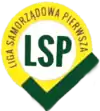 |
First Self-Governance League Liga Samorządowa Pierwsza |
LSP | Ryszard Ziobro | Silesian localism[19] Decentralisation[20] |
Local party from the Pszczyna County allied with the Polish Socialist Party.[21] The party wants to decentralise Polish administration and greatly empower local governments, and summarised its program by stating: "Silesia - regional and aware of its national and cultural identity. Poland - regional, not centralised".[19] | |
| Kashubian Association Wspólnota Kaszubska |
WK | Karol Rhode | Kashubian regionalism Kashubian autonomism[22] |
A regionalist party representing the interests of the Kashubian minority. The party demands Kashubian autonomy as a way to preserve Kashubian culture and language. The party is a member of EFA.[23] | ||
| Silesian Regional Party Śląska Partia Regionalna |
ŚPR | Rafał Adamus | Silesian regionalism Silesian autonomism |
Party associating regionalists from Silesian local organizations. The most important of them is the Silesian Autonomy Movement. Affiliated with EFA. | ||
| Silesian Separatist Movement Śląski Ruch Separatystyczny |
ŚRS | Dariusz Jerczyński[24] | Silesian separatism[25] Social democracy[26] |
A minor party founded in 2007 whose main goal is "national and territorial separation of Silesia and the sanctioning of Silesian nationality". The party claims to continue the legacy of Silesian autonomist Józef Kożdoń, who in 1910 wrote: "We do not know Polish patriotism, we do not know the Polish homeland. Silesia does not long for mother Poland".[25] | ||
| Silesian Autonomy Movement Ruch Autonomii Śląska |
RAŚ | Jerzy Gorzelik | Silesian autonomism Pro-Europeanism |
Silesian autonomist party that seeks to restore the interwar Silesian autonomy. The party is a member of the European Free Alliance and formed an electoral alliance with the Civic Platform.[27] | ||
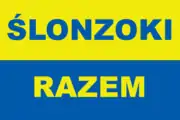 |
Silesians Together Ślonzoki Razem |
ŚR | Leon Swaczyna | Linguistic separatism[28] Silesian separatism[29] |
A Silesian regional party founded in 2017, based on the concept of working together with the German minority in Silesia. The party believes that the Silesian nation and culture are completely separate from the Polish nation, and many of the party's members hold separatist views.[30] | |
Parties difficult to define/regional
| Logo | Party | Leader | Ideology | Comments | ||
|---|---|---|---|---|---|---|
| Common Powiat Wspólny Powiat |
WP | Zygmunt Worsa | Silesian localism Pro-Europeanism[31] |
Local party from the Świdnica County, mistakenly called Active Local Politicians (Polish: Aktywni Samorządowcy).[32] The party is allied with the Civic Platform and the Democratic Left Alliance.[33] Common Powiat is pro-European and actively promotes extensive development and investment projects.[31] | ||
 |
Development Party[34] Partia Rozwoju |
PR | Arnold Buzdygan | Classical liberalism[35] Secularism |
Party created by businessman and user of Polish Usenet Arnold Buzdygan. It does not carry out any activities. | |
| I've Had Enough 2023 Mam Dość 2023 |
Mam Dość | Marianna Schreiber | Social liberalism[36] | Party announced in 2022 by Marianna Schreiber, wife of Łukasz Schreiber. | ||
| Patriotic Party of Poland and the Polish Diaspora Stronnictwo Patriotyczne Polski i Polonii |
SPPiP | Zenon Miller | Polish minority interests | Political party which associates Poles living abroad. | ||
| Community[37] Wspólnota |
WSP | Andrzej Anusz | Christian democracy[38] Familialism[39] |
Party founded by former MP Andrzej Anusz, who belonged to parties from all sides of the political spectrum. | ||
| Slavic Union Związek Słowiański |
ZS | Zbigniew Adamczyk | Economic nationalism Russophilia Anti-Americanism[40] |
Minor party founded in 2006 that wants to reorient Polish foreign policy - it advocates for leaving the EU and pursuing closer relations with Russia and Belarus instead.[40] | ||
Historical parties
Important defunct parties after 1989
| Party | Leader | Ideology | European affiliation |
Founded | Dissolved | Comments | |||
|---|---|---|---|---|---|---|---|---|---|
| Solidarity Citizens' Committee Komitet Obywatelski "Solidarność" |
KO "S" | Bronisław Geremek | Big tent Anti-communism Liberal democracy |
1989 | 1991 | Initially a semi-legal political organisation of the democratic opposition in Communist Poland. In the partially-free 1989 election KO "S" won all 161 seats available in the Sejm, and 99 out of 100 seats in the senate. On 25 August 1989, the new "Contract Sejm" elected its candidate Tadeusz Mazowiecki as Prime Minister, making him the first ever non-Communist head of government east of the Iron Curtain. Shortly afterwards, the Committee broke up into several smaller parties. | |||
| Christian National Union Zjednoczenie Chrześcijańsko-Narodowe |
ZChN | Wiesław Chrzanowski | National Catholicism National conservatism Christian democracy |
1989 | 2010 | Party formed by Catholic politicians of KO "S". In 1991 election it took 3rd place, winning 8.74% and introducing 49 MPs. ZChN was a member of two government coalitions. In 1993 the party did not cross electoral threshold and in 1997 it became member of AWS. In 2001 most of ZChN activists joined LPR or PiS. Party lost its former significance. | |||
| Social Democracy of the Republic of Poland Socjaldemokracja Rzeczypospolitej Polskiej |
SdRP | Aleksander Kwaśniewski | Social democracy Third Way Progressivism |
SI | 1990 | 1999 | Party was formed after the dissolution of communist PZPR. In 1991 it created the left-wing SLD coalition. In the election held this year it won 11.99% of the votes, taking second place. Two years later SLD won election and in 1995 Aleksander Kwaśniewski became president. In 1997 the party lost power. In 1999 SdRP co-founded a unified party SLD and dissolved itself. | ||
 |
Party of Regions Partia Regionów |
PR | Bolesław Borysiuk | Agrarianism Socialism Regionalism |
2007 | 2017 | Party that seceded from Self-Defence of the Republic of Poland following its electoral down in the 2007 elections. The party strongly supported regionalism, intending to revive local and regional traditions and patriotism. The party envisioned a decentralised Poland full of "regional, small homelands". PR cooperated with left-wing parties such as the Democratic Left Alliance and the Polish Socialist Party. The party won 38 councillor seats in the 2010 Polish local elections, but never entered the national Sejm. The party was deregistered in early 2017. | ||
| Centre Agreement Porozumienie Centrum |
PC | Jarosław Kaczyński | Anti-communism Centrism Christian democracy |
EDU | 1990 | 2001 | Party founded in 1990, demanded a break with previous policy of the government of Tadeusz Mazowiecki, who was accused of leaving the remains of communism too slowly. PC candidate Lech Wałęsa won the presidential election, but later on he got into conflict with the party. In 1991, PC received 8.71% of the votes, introducing 44 MPs, but in 1993 only 4.42% (below the electoral threshold). In 1997 party started from AWS and ROP lists, introducing 15 MPs. In 2001 PC was transformed into the currently ruling PiS. | ||
| Citizens' Movement for Democratic Action Ruch Obywatelski Akcja Demokratyczna |
ROAD | Władysław Frasyniuk | Liberalism Social liberalism Laicism |
1990 | 1991 | Party was founded in response to creation of PC by Jarosław Kaczyński. In 1990 presidential election it supported candidacy of Tadeusz Mazowiecki, who took 3rd place. In 1991, ROAD merged with FPD and established the UD. | |||
| Forum of Democratic Right Forum Prawicy Democratycznej |
FPD | Aleksander Hall | Conservative liberalism Liberal conservatism Christian democracy |
1990 | 1991 | Party formed by moderate right-wing politicians of KO "S". In 1991 it merged with ROAD to form UD. | |||
| Polish Social Democratic Union Polska Unia Socjaldemokratyczna |
PUS | Tadeusz Fiszbach | Social democracy Social patriotism Welfare state |
1990 | 1991 | Along with SdRP, PUS was one of successor parties of communist PZPR. The party itself was succeeded by currently existing UP. | |||
| Liberal Democratic Congress Kongres Liberalno-Demokratyczny |
KLD | Donald Tusk | Economic liberalism Neoliberalism Conservative liberalism |
EDU | 1990 | 1994 | Party originated from Gdańsk Social-Economic Society "Congress of Liberals". In 1991 elections KLD won 7.49% of votes and 37 seats in the Sejm. In 1993 it did not reach electoral threshold and a year later merged with UD to form UW. | ||
| Polish Beer-Lovers' Party Polska Partia Przyjaciół Piwa |
PPPP | Janusz Rewiński | Political satire Beerism Anti-alcoholism |
1990 | 1993 | Party founded by popular satirists. Originally, its goal was to promote cultural beer-drinking in English-style pubs instead of vodka and thus fight alcoholism. In 1991 election PPPP won 16 seats in the Sejm capturing 2.97% of the vote. Party soon split into Large Beer and Small Beer factions. Eventually PPPP was dissolved in 1993. | |||
| Party X Partia X |
X | Stanisław Tymiński | Populism Anti-establishment Syncretic politics |
1990 | 1999 | Party was established by businessman Stanisław Tymiński who took 2nd place in 1990 presidential election. In 1991 parliamentary elections it received 0.47% of the vote, winning three seats in the Sejm. Despite increasing its vote share in the 1993 election to 2.74%, it failed to win a seat, following introduction of a 5% electoral threshold. Party failed to collect enough signatures for Tymiński to run in the 1995 presidential elections. | |||
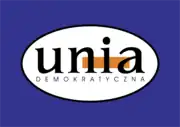 |
Democratic Union Unia Demokratyczna |
UD | Tadeusz Mazowiecki | Liberalism Social liberalism Christian democracy |
1991 | 1994 | Party was founded by Prime Minister Tadeusz Mazowiecki as a merger of ROAD and FPD. It won election this year with 12.32% of the vote and 62 MPs. A year later conservative faction left party. In 1993 election UD took 3rd place (10.59% of votes and 74 MPs) and a year later merged with KLD to form UW. | ||
| Peasants' Agreement Porozumienie Ludowe |
PL | Gabriel Janowski | Agrarianism Conservatism Christian democracy |
1991 | 1999 | In 1991 parliamentary election party received 5.5% of the vote, winning 28 seats in the Sejm. It joined the coalition governments headed by Jan Olszewski and Hanna Suchocka. Due to several splits and internal disagreements, 1993 elections saw the party's vote share fall to 2.4%. As it had failed to pass the 5% electoral threshold, it lost all its parliamentary representation. In 1997 PL joined AWS. | |||
| Movement for the Republic Ruch dla Rzeczypospolitej |
RdR | Jan Olszewski | Anti-communism National conservatism Paternalistic conservatism |
1992 | 1999 | Party founded by overthrown former Prime Minister Jan Olszewski and a group of radically anti-communist MPs who demanded full lustration. In 1993 elections, RdR obtained 2.7% of the votes and did not cross electoral threshold. Two years later Olszewski took 4th place in presidential election. In 1995, the most important RdR politicians founded ROP, while the rest of party joined AWS. | |||
| Nonpartisan Bloc for Support of Reforms Bezpartyjny Blok Wspierania Reform |
BBWR | Andrzej Olechowski | Big tent Populism Pro-Wałęsa politics |
1993 | 1997 | Party affiliated with President Lech Wałęsa. It was founded to continue the traditions of Józef Piłsudski's pre-war Nonpartisan Bloc for Cooperation with the Government (Bezpartyjny Blok Współpracy z Rządem), which likewise had been known by the same initials, BBWR. In 1997 became part of AWS. | |||
| Freedom Union Unia Wolności |
UW | Bronisław Geremek | Liberalism Social liberalism Economic liberalism |
ALDE | 1994 | 2005 | Party was founded out of merger of UD and KLD. In 1997 election UW got 13.37% of the votes and 60 seats. It joined government coalition with AWS. In 2001 some members of UW decided to create new party PO, which got 12.68% of the votes and 65 seats in general elections whilst UW failed to cross the 5% threshold required to gain entry to the lower house of Parliament, receiving only 3.10%. Surprisingly, party managed to cross the required 5% threshold in 2004 European Parliament election, receiving 7.33% of votes and 4 seats. In 2005 UW was transformed into PD. | ||
| Movement for Reconstruction of Poland Ruch Odbudowy Polski |
ROP | Jan Olszewski | National conservatism Paternalistic conservatism Social conservatism |
1995 | 2012 | Party was established after 1995 presidential election, which ended with an unexpectedly good result for Jan Olszewski (4th place, 6.86% of votes). Despite formation of AWS, which integrated almost all centre-right and right-wing parties, ROP, encouraged by the high support in polls, decided to stay outside the federation. Eventually, in 1997 election party received 5.56% of support and introduced only 6 MPs (including Jarosław Kaczyński - Chairman of PC, whose other members ran from AWS lists). In 2001 party participated in election on LPR lists and in following years lost its significance. | |||
| Solidarity Electoral Action Akcja Wyborcza Solidarność |
AWS | Marian Krzaklewski | Solidarism Christian democracy Social conservatism |
1996 | 2001 | Formation of party was connected with integration of post-Solidarity parties into a broad electoral block. AWS won 1997 parliamentary election gaining 33.83% of votes and 201 seats. It formed a coalition with UW, which collapsed in 2000. Chairman Marian Krzaklewski became AWS candidate in 2000 presidential election. His candidacy did not arouse general consensus - some activists were largely in favour of independent Andrzej Olechowski. Krzaklewski won 15.57% of votes, finishing third. In 2001 liberal wing left AWS and joined new party PO, created by a part of former UW politicians. Trade union NSZZ "Solidarity" decided not to participate in political structures anymore. Activists associated with the Kaczyński brothers created another new party - PiS. Christian-national wing joined LPR. As a result of parliamentary election in 2001, AWS failed to cross the 8% threshold required to gain entry to the Sejm as coalition, receiving only 5.60% of votes. Shortly afterwards, federation ceased to exist. | |||
| Conservative People's Party Stronnictwo Konserwatywno-Ludowe |
SKL | Jan Rokita | Liberal conservatism Christian democracy Agrarianism |
1997 | 2014 | Creation of party was result of merger of several small, moderately conservative parties. It was also joined by some former UW MPs. It quickly joined AWS. In 2001 party participated in elections by running from PO lists. The most important politicians (including future President Bronisław Komorowski) joined PO and SKL became marginal. In 2014 party joined Agreement. | |||
| National-Catholic Movement Ruch Katolicko-Narodowy |
RKN | Małgorzata Romanowicz | National Catholicism National conservatism Political Catholicism |
1997 | 2023 | Created in 1997 by politician Antoni Macierewicz. He left it in 2012. | |||
| Polish Labour Party Polska Partia Pracy |
PPP | Bogusław Ziętek | Marxism Trotskyism Anti-capitalism |
EACL | 2001 | 2017 | Small party of the extreme left. Despite lack of electoral successes, it managed to run in elections many times and gain recognition. | ||
| Feminist Initiative Inicjatywa Feministyczna |
IF | Iwona Piątek Elżbieta Jachlewska Katarzyna Kądziela |
Feminism Women's rights Social progressivism |
2007 | 2020 | Party was registered in 2007 and was known as "Women's Party" (Partia Kobiet) until 2016. On 21 October 2007 National Assembly election, it won 0.28% of the popular vote and no seats in the Sejm or the Senate. | |||
| Democratic Party – democrats.pl Partia Demokratyczna – demokraci.pl |
PD | Władysław Frasyniuk | Liberalism Social liberalism Progressivism |
ALDE | 2005 | 2016 | Party was supposed to become an extension of UW by politicians coming from the left, social democratic Prime Minister Marek Belka was one of its founders. Some notable politicians did not join the new party. In 2005 parliamentary election PD did not reach the electoral threshold, obtaining the result of 2.45% of votes. In the following years, party unsuccessfully joined several centre-left electoral coalitions. In 2016 PD was renamed to UED. 4 MPs of PO joined new party. | ||
| Poland Comes First Polska Jest Najważniejsza |
PJN | Paweł Kowal | Conservative liberalism Liberal conservatism Christian democracy |
ACRE | 2010 | 2013 | Party was founded by liberal wing of PiS, which did not agree with its economic policy. In 2011 parliamentary election PJN received 2.19% of the votes, which did not allow it to obtain seats in the Sejm. In 2013 party joined Agreement. | ||
| Your Movement Twój Ruch |
TR | Janusz Palikot | Progressivism Social liberalism Anti-clericalism |
2011 | 2023 | Founded by Janusz Palikot, a former Civic Platform MP, in 2010, as Palikot's Movement. It adopted its current name in 2013. In 2011 parliamentary election, party received 10% of the vote and won 40 seats in the Sejm, making it the third party behind Civic Platform and Law and Justice, one of the best debut performances for a party since the end of communism. In 2015 parliamentary election United Left list was led by Your Movement's Barbara Nowacka and received only 7.6% of the vote, below the 8% threshold, leaving TR without parliamentary representation. | |||
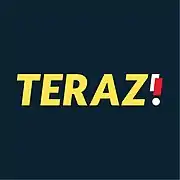 |
Now! Teraz! |
Teraz! | Ryszard Petru | Liberalism Economic liberalism Pro-Europeanism |
ALDE | 2018 | 2019 | Party founded by Ryszard Petru after leaving .Nowoczesna party. Turned out to be ephemeral and quickly dissolved. | |
| Free and Solidary Wolni i Solidarni |
WiS | Kornel Morawiecki | Solidarism State interventionism Anti-communism |
2016 | 2020[41][42] | Party formed by Kornel Morawiecki, former Senior Marshal of the Sejm. MPs of the party were elected from the lists of Kukiz'15. Formerly declared support for Prime Minister Beata Szydło and her government, but later moved into opposition to the government of Mateusz Morawiecki. WiS lost all seats in 2019. | |||
| Party of Drivers Partia Kierowców |
PK | Lech Kędzierski | Drivers' rights Anti-bureaucratism |
2019 | 2022 | Created in 2019 and dissolved in 2022. Member of Confederation. | |||
| Social Justice Movement Ruch Sprawiedliwości Społecznej |
RSS | Piotr Ikonowicz | Socialism Anti-capitalism Communism |
2014 | 2023 | Founded in 2014 by social activist Piotr Ikonowicz based on his Social Justice Chancellery. Before the presidential elections in 2015, RSS supported candidate of The Greens Anna Grodzka, who did not collect the required number of signatures. | |||
Defunct parties of People's Republic of Poland
| Party | Leader | Ideology | European affiliation |
Founded | Dissolved | Comments | |||
|---|---|---|---|---|---|---|---|---|---|
 |
Polish United Workers' Party Polska Zjednoczona Partia Robotnicza |
PZPR | Bolesław Bierut (first) | Communism Marxism-Leninism |
Cominform | 1948 | 1990 | PZPR was established at unification congress of PPR and PPS during meetings in 1948. Unification was possible because PPS activists who opposed it had been forced out of party. PZPR ruled Poland in the years until 1989. During semi-free election this year communists won 65% of seats in the Sejm, though seats won were guaranteed and PZPR was unable to gain a majority, while 99 out of 100 seats in Senate freely contested were won by Solidarity-backed candidates. Jaruzelski won presidential ballot by one vote. In 1990 PZPR was renamed to SdRP. | |
 |
United People's Party Zjednoczone Stronnictwo Ludowe |
ZSL | Władysław Kowalski (first) | Agrarian socialism Peasant movement |
1949 | 1989 | Party was formed from the merger of communist SL with remnants of the independent PSL of Stanisław Mikołajczyk. ZSL became – as intended from its beginning – a satellite party of PZPR, representing it in rural areas. In 1989 after victory of Solidarity in legislative elections together with PZPR's other satellite party, SD, ZSL decided to support opposition. At party congress ZSL merged with anti-communist PSL in exile, forming today's PSL. SD exists until now. | ||
Defunct and historical political parties in the Second Polish Republic, 1918–1939
- Agudath Israel
- Bloc of National Minorities – Blok Mniejszosci Narodowych
- General Jewish Labour Bund in Poland
- Camp of National Unity – Obóz Zjednoczenia Narodowego, OZN ("Ozon", continuation of BBWR, nationalist)
- Centrolew, "Center-Left" – coalition of parties.
- Chjeno-Piast – coalition of that included the Polish People's Party "Piast" and Christian Association of National Unity
- Christian Democracy – Labor Party – Chrześcijańska Demokracja (ChD)
- Communist Party of Poland – Komunistyczna Partia Polski, KPP – (communist, illegal)
- Folkspartei – Jewish People's Party ('Folkists')
- German Socialist Labour Party of Poland – (German: Deutsche Sozialistische Arbeitspartei Polens, abbreviated DSAP, Polish: Niemiecka Socjalistyczna Partia Pracy w Polsce)
- Labor Party – Stronnictwo Pracy, SP
- National Democracy – Narodowa Demokracja, ND ("Endecja") (nationalist)
- Popular National Union – Związek Ludowo-Narodowy, ZLN
- National Party – Stronnictwo Narodowe, SN
- National Radical Camp – Obóz Narodowo-Radykalny, ONR (extreme-right)
- National Radical Camp ABC
- National Radical Camp Falanga – Obóz Narodowo-Radykalny Falanga or Falanga
- National Workers' Party – Narodowa Partia Robotnicza, NPR
- Nonpartisan Bloc for Cooperation with the Government – Bezpartyjny Blok Współpracy z Rządem, BBWR (organization of Sanacja)
- Peasant Party – Stronnictwo Chłopskie, SCh
- People's Party – Stronnictwo Ludowe, SL
- Polish People's Party – Polskie Stronnictwo Ludowe, PSL (agrarian, liberal conservative)
- Polish People's Party "Piast" – Polskie Stronnictwo Ludowe "Piast", PSL "Piast" (agrarian, conservative)
- Polish People's Party "Wyzwolenie" – Polskie Stronnictwo Ludowe "Wyzwolenie", PSL "Wyzwolenie" (agrarian socialism, secularism)
- Polish People's Party "Left" – Polskie Stronnictwo Ludowe "Lewica", PSL "Lewica" (agrarian socialism, anti-clericalism)
- Polish Socialist Party – Polska Partia Socjalistyczna, PPS (socialist)
- Polish Socialist Party – Revolutionary Faction – Polska Partia Socjalistyczna – Frakcja Rewolucyjna
- Polish Socialist Party – Left – Polska Partia Socjalistyczna – Lewica
- Sanation – Sanacja (meant to "restore health" to the body politic: authoritarian, centrist)
- Ukrainian National Democratic Alliance – (UNDO) (Ukrainian: Українське національно-демократичне об'єднання, УНДО, Ukrayin'ske Natsional'no-Demokratichne Obyednannia, Polish: Ukraińskie Zjednoczenie Narodowo-Demokratyczne)
- Związek Chłopski ZCh (Polish Wikipedia article)
Defunct and historical parties Political parties before 1918
- Polish Social Democratic Party – Polska Partia Socjaldemokratyczna (1890-1919)
- Polish Socialist Party – Polska Partia Socjalistyczna (1892-1948)
- Social Democracy of the Kingdom of Poland and Lithuania – Socjaldemokracja Krolestwa Polskiego i Litwy (1893-1918)
- Polish Socialist Party of the Prussian Partition – Polska Partia Socjalistyczna Zaboru Pruskiego (1893-1919)
- Polish Socialist Party – Revolutionary Faction – Polska Partia Socjalistyczna - Frakcja Rewolucyjna (1893-1918)
- National-Democratic Party – Stronnictwo Narodowo-Demokratyczne (1897-1919)
- National Workers' Union – Narodowy Związek Robotników (1905-1920)
- Polish Socialist Party – Left – Polska Partia Socjalistyczna - Lewica (1906-1918)
- Christian Democratic Party – Stronnictwo Chrześcijańskiej Demokracji (1919-1937)
- Polish Socialist-Democratic Party of Galicia and Cieszyn Silesia – Polska Partia Socjalno-Demokratyczna Galicji i Śląska Cieszyńskiego
- Progressive-Democratic Union – Związek Postępowo-Demokratyczny
- Real Politics Party – Stronnictwo Polityki Realnej
- Polish People's Party – Polskie Stronnictwo Ludowe
- National Workers' Faction – Narodowe Stronnictwo Robotników
- Peasantry Union – Związek Stronnictwa Chłopskiego
- Popular Christian Party – Stronnictwo Chrześcijańsko-Ludowe
- Polish Popular Centre – Polskie Centrum Ludowe
References
- Michał Kolanko (17 February 2022). "Kołodziejczak: Budujemy partię ludowo-socjaldemokratyczną, a nie partię buntu". rp.pl (in Polish). Retrieved 1 August 2023.
- "AZER – polityczni emeryci w akcji". newsbar.pl (in Polish). 17 July 2019. Retrieved 30 August 2023.
- Dominik Sieklucki (2006). "Partie lewicy i centrolewicy w polskim systemie partyjnym: Aktywność SLD, PSL i UP na polskiej scenie politycznej" (PDF). ruj.uj.edu.pl (in Polish). Kraków: Wydawnictwo Uniwersytetu Jagiellońskiego. ISBN 978-83-233-2241-2. Retrieved 10 August 2023.
- Michał Syska (5 August 2019). "„Razem możemy więcej"". krytykapolityczna.pl (in Polish). Retrieved 10 August 2023.
- "O prezydenturę w 16 miastach wojewódzkich walczy 111 kandydatów. Najwiecej w Łodzi -12". gazetaprawna.pl (in Polish). 31 October 2010. Retrieved 23 August 2023.
- "Nie żyje Henryk Dzido, obrońca Andrzeja Leppera. Miał 77 lat". radiozet.pl.pl (in Polish). 9 October 2010. Retrieved 23 August 2023.
- Gerrit Voerman [in Dutch]; Dirk Strijker; Ida Terluin (2015). "Contemporary Populism, the Agrarian and the Rural in Central Eastern and Western Europe". In Sarah de Lange [in Dutch] (ed.). Rural Protest Groups and Populist Political Parties. Wageningen Academic Publishers. p. 172. doi:10.3920/978-90-8686-807-0. ISBN 9789086862597.
- "Tak dla państwa przyjaznego osobom z niepełnosprawnościami". Retrieved 3 August 2023.
- Sztandera, Marcin (29 May 2023). "Nowa Demokracja TAK Marka Materka oficjalnie zaprezentowana. Prezydent Starachowic premierem?". wyborcza.pl (in Polish).
- "Bezpartyjni Samorządowcy: mamy program; systematycznie pokażemy naszych kandydatów do parlamentu". wnp.pl (in Polish). 4 August 2023. Retrieved 5 August 2023.
- "Wystartują z numerem "jeden". Czy Bezpartyjni Samorządowcy będą czarnym koniem wyborów?". natemat.pl (in Polish). 1 October 2018. Retrieved 5 August 2023.
- "Statut". onp-lp.pl (in Polish). Archived from the original on 3 June 2017. Retrieved 8 August 2023.
- "Second Republic of Poland party". druga-rzeczpospolitapolska.pl. Archived from the original on 31 January 2021.
- "Partia Druga Rzeczpospolita Polska. Program i misja polityczna". biznesnaprawo.pl (in Polish).
- Mateusz Sikorski (25 August 2022). "Postulują niższe podatki i wolność światopoglądową. Kim są Libertarianie i dlaczego niewielu o nich słyszało?". olsztyn.com.pl (in Polish).
- "Nasze cele". inicjatywa-obywatelska.eu (in Polish). Retrieved 9 August 2023.
- "Historia". inicjatywa-obywatelska.eu (in Polish). Retrieved 9 August 2023.
- Tomasz Olszewski (7 January 2014). "Bohaterski poseł". inicjatywa-obywatelska.eu (in Polish). Retrieved 22 August 2023.
- Oskar Piecuch (1 October 2018). "Kampanię zainaugurowała Liga Samorządowa Pierwsza". pless.pl (in Polish). Retrieved 10 August 2023.
- "Liga Samorządowa prezentuje program i kandydatów". pszczynska.pl (in Polish). 2 October 2018. Retrieved 10 August 2023.
- "Liga Samorządowa prezentuje program i kandydatów". pszczynska.pl (in Polish). 2 October 2018. Retrieved 10 August 2023.
- "FAQ". kaszebsko.com (in Kashubian). Retrieved 9 August 2023.
- "Kaszëbskô Jednota zrzesza się z European Free Alliance". gazetakartuska.pl (in Polish). Retrieved 22 February 2019.
- "Ślązacy - Dariusz Jerczyński" (PDF). nwsd.pl (in Polish). Retrieved 16 August 2023.
- Pietrasz, Piotr (2 September 2011). "Separatyści śląscy na listach PSL?". wpolityce.pl (in Polish). Retrieved 16 August 2023.
- Nowak, Krzysztof (2015). "Śląsk Cieszyński w latach 1918–1945". Dzieje Śląska Cieszyńskiego od zarania do czasów współczesnych pod redakcją Idziego Panica (PDF) (in Polish). Vol. 6. Cieszyn: Starostwo Powiatowe w Cieszynie. p. 58. ISBN 978-83-935147-5-5.
- Jedlecki, Przemysław (5 November 2021). "Sekretarz RAŚ zapisał się do PO. Czy to już koniec śląskich autonomistów?" (in Polish).
- "Programmmanifest". slonzokirazem.org (in German). Retrieved 6 April 2023.
- "Partie regionalne na Górnym Śląsku odpowiadają na 11 pytań, a Wachtyrz komentuje". wachtyrz.eu (in Polish). Retrieved 2 March 2022.
- Ozimek-Hanslik, Magdalena (January 2023). "„To ńyma nasz fajer!", czyli o śląskiej polityczności. Czynniki integracji i dezintegracji w procesie kształtowania się fenomenu śląskiej etniczności". Studia Politologiczne (in Polish). Opole University. 66 (4). doi:10.33896/SPolit.2022.66.4.
- Agnieszka Szymkiewicz (17 September 2018). "Wspólny Powiat. Stara nazwa, (prawie) nowa ekipa [FOTO]". swidnica24.pl (in Polish). Retrieved 21 August 2023.
- "Karuzela polityczna – archiwum". karuzelapolityczna.wordpress.com (in Polish). 30 April 2019. Retrieved 22 August 2023.
- "Zygmunt Worsa tworzy Wspólny Powiat". swidnica24.pl (in Polish). 29 January 2014. Retrieved 21 August 2023.
- "Partia Rozwoju". bip.warszawa.so.gov.pl (in Polish). Retrieved 11 August 2023.
- "Misja". partia-rozwoju.org (in Polish). Archived from the original on 26 May 2022. Retrieved 11 August 2023.
- https://www.ofeminin.pl/swiat-kobiet/marianna-schreiber-zalozyla-partie-mam-dosc-2023-jakie-ma-cele/wgj4635 Marianna Schreiber założyła partię MAM DOŚĆ 2023. Jakie ma cele?
- W. Hermeliński (30 September 2015). "Komunikat Państwowej Komisji Wyborzej z dnia 11 września 2015 r. o komitetach wyborczych utworzonych w związku z wyborami do Sejmu Rzeczypospolitej Polskiej i do Senatu Rzeczypospolitej Polskiej, zarządzonymi na dzień 25 października 2015 r." (PDF). isap.sejm.gov.pl (in Polish). Monitor Polski: Dziennik Urzędowy Rzeczypospolitej Polskiej. Retrieved 10 August 2023.
- Bogdan Borowik (2011). "Partie Konserwatywne w Polsce 1989-2001" (PDF). phavi.umcs.pl (in Polish). Lublin: Wydawnictwo Universytetu Marii Curie-Skłodowskiej. p. 56. Retrieved 10 August 2023.
- "Debata w Piastowie". andrzejanusz.pl (in Polish). Warsaw. 28 September 2011. Retrieved 10 August 2023.
- Adam Sofuł (1 September 2015). "Związek Słowiański: więcej więzi ze Wschodem". Retrieved 6 August 2023.
- "Koniec Wolnych i Solidarnych".
- "Kornel Morawiecki nie byłby z tego zadowolony. Przykra wiadomość". 7 February 2020.
Further reading
- Dariusz Cecuda, Leksykon Opozycji Politycznej 1976-1989, BIS Trust, Warszawa 1989
- Małgorzata Dehnel-Szyc, Jadwiga Stachura, Gry polityczne. Orientacje na dziś, Oficyna Wydawnicza Volument, Warszawa 1991
- Piotr Frączak (e.d), Gorączka czasu przełomu. Dokumenty ugrupowań radykalnych 1989-1990, Instytut Studiów Politycznych Polskiej Akademii Nauk, Wydawnictwo Adam Marszałek, Warszawa 1984
- Inka Słodkowska (ed.), Programy partii i ugrupowań parlamentarnych 1989-1991' vol. 1–2, Instytut Studiów Politycznych Polskiej Akademii Nauk, Warszawa 1995




_logo.svg.png.webp)
.svg.png.webp)
